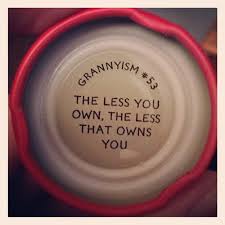Being a hoarder is almost trendy now with several hit TV shows covering the stories of people who suffer from the addiction. It seems every time I tell someone I’m a personal organizer, after they tell me I should come to their house, I get asked, “Ooooh, do you have any hoarder clients?!”
Those who suffer from hoarding addiction may or may not suffer from obsessive compulsive disorder, depression, and anxiety, and a traumatic incident, such as a family trauma or personal loss, may or may not have triggered the compulsion. Oftentimes those who hoard are judged, made fun of, or are simply misunderstood to the point of isolation, and are left to suffer alone.
While this post’s title is “How to Reason with a Hoarder,” hoarders or those with hoarding loved ones must seek a professional mental health expert to treat the person. All of the organizers and cleaners in hazmat suits in the world won’t help them if the underlying issue goes unsolved. We need to stop shaming those who go to therapy and pop the taboo bubble surrounding those who seek mental health professionals. We as a culture must admit to our own issues and celebrate any effort made to solve them in order to become better people. I believe that every single person could benefit from talk therapy, among other things. We all want to feel better, and hoarding is simply a coping mechanism. I guarantee we all have them in one form or another.
A friend recently confided in me that his marriage ended because his wife was a hoarder. Things had become so bad that she injured herself when she fell down her stairs due to her clutter. They are now selling their family home, and he has spent weeks decluttering the mess she left behind – mountains of clothing with the tags still attached, etc. The beautiful thing that came out of all of this, though, is he told me what used to be anger toward her has turned into compassion. He is able to sympathize with his soon-to-be ex-wife, although he now knows it is not up to him to get her the help she needs. We all must be willing to accept help, especially when it comes repeatedly from loved ones – this goes for any addiction.
While labeling someone a “hoarder” is extreme, we all probably know people in our lives who have trouble letting go, maybe even ourselves. Material things become emotionally embedded in how we view the world, and the thought of removing them from our lives becomes unbearable and terrifying. We are all somewhere on the spectrum between being zen minimalists and hoardy hoarders. Empathy and compassion are important to keep in mind when dealing with someone towards the latter end of the spectrum. It is especially difficult when you live with the person as their things infringe on your environment and block out the air and light that you would carve out for yourself.
If you have decided to or have been invited to work with a hoarder, here are some tips:
- Be gentle, sympathetic, and compassionate.
- First have a discussion about why they have made a decision to change, identifying goals. Post these goals in a central location as a reminder.
- Choose a room to start in, choose a corner, and work your way around the perimeter of the room. If it helps to make a check-list of each room for your progress, do it.
- Label 4 large bins: Recycling, Trash, Donate, Keep
- Follow the OHIO rule – Only Handle It Once! As you pick up each item, they must decide what to do with it on the spot. Let them ease into it and take their time. When it comes to things they want to keep, ask if they’ve used it within a year. Anything they haven’t should be donated. Anything to which they say, “I’m gonna use,” “I might use”, or “I could use” also needs to be donated. Nothing gets to be decided on later.
- Remind them that having a clutter-free home and accomplishing the goals they stated at the beginning is more important than each individual item they are struggling to let go of. Also, each item that lands in the keep bin must spark joy.
- As soon as a bin is full, deal with it. Donations should be moved right out to your car or be picked up by the organization (Habitat ReStore picks up furniture, Clothing Donations will pick up clothing, etc.) Trash should be put directly in the dumpster and recycling should be removed from the house as well – even if this means taking items to your personal vehicle. This will prevent the hoarder from digging through items they already decided to let go of and second guessing themselves.
- Use It’s Deductible to keep track of what is being donated and they could get a huge tax deduction – it literally pays to declutter!
- Sometimes a reward system helps: for each charity bin that gets filled or each room that is completed, come up with a reward (e.g. walk around the neighborhood, piece of candy, etc.). The reward can’t be stuff-related!
- Don’t bite off more than you can chew in a day. This is overwhelming work, especially for the person struggling to let go. Set a goal and accomplish it. Get the things that have been decided upon out of the house, and start fresh the next day. Repeat the goals to yourself and your partner, and keep your eyes on the prize! It also helps to play fun music and open windows to let in light and fresh air while you are working. Take before and after pictures of your progress with their permission as a reminder of what you can accomplish!
Do you have any experience with hoarders? Or do you struggle to let go of things? How have you taken steps to declutter and/or make positive changes in your life or theirs? Let me know in the comments below!
Happy Organizing,
E

